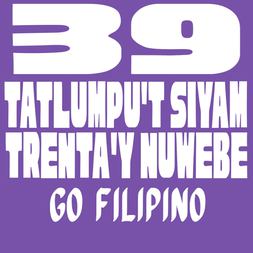
Lesson 52: IPAG- Benefactive Verbal Aspects
After the I- Benefactive Verbal Aspects, we now learn how the IPAG- Benefactive Focus Verbs are expressed if the action happened, is currently happening, and is anticipated to happen. A heartfelt appr

Lesson 51: I- Benefactive Verbal Aspects
The verbal aspects of I- Benefactive Focus Verbs are similar to that of I- Object Focus Verbs. They are, however, different when it comes to their respective sentence structures.A heartfelt appreciati

Lesson 50: Tagalog Slang Words (Part 1)
Let's spice up our Tagalog course with a special topic every 10 episodes, beginning with an introduction to Tagalog slang words. A heartfelt appreciation to my $5 Patrons mentioned as of this recordin

Lesson 49: -AN Locative Verbal Aspects
While the verbal aspects of -AN Object Focus Verbs and -AN Locative Focus Verbs are similar, the difference lies in their functions and sentence structures. This lesson centers on the -AN Locative Ver

Lesson 48: -AN Object Verbal Aspects
The verbal aspects of -AN Object Focus Verbs and -AN Locative Focus Verbs share the same pattern. The difference lies in sentence structure. We will focus on the -AN Object Verbal Aspects first, while

Lesson 47: I- Object Verbal Aspects
The verbal aspects of I- Object Focus Verbs are mostly similar to that of -IN Object Focus Verbs, but with an added twist.A heartfelt appreciation to my $5 Patrons mentioned as of this recording:My he

Lesson 45: MANG- Verbal Aspects
This lesson covers the verbal aspects of MANG- Actor Focus Verbs. The MANG- prefix has a unique feature: it morphs depending on the first letter of the root word.A heartfelt appreciation to my $5 Patr

Lesson 43: MAG- Verbal Aspects
Now that we have learned how verbal aspects work, let's discuss how they are applied to MAG actor focus verbs.Stick around at the end of this episode to listen to a preview of Kakayanin: Filipino Suc

Lesson 41: Benefactive, Instrumental, And Causative Focus Verbs
This lesson talks about the last batch of verbal focus, namely: Benefactive (which uses the I- or IPAG- prefixes), Instrumental (which uses the IPANG-, IPAM- or IPAN- prefixes), and Causative/ Rationa

Lesson 40: -IN And PAG-AN Locative Focus Verbs
Apart from the -AN suffix, Locative Focus Verbs use the -IN suffix and the PAG-AN affix combination.A heartfelt appreciation to my $5 Patrons mentioned as of this Putz, Isak Buan, Glad

Lesson 39: -AN Locative Focus Verbs
(NOTE: This episode was originally published on Patreon on October 28, 2020.)Another function of the -AN suffix is to create locative focus verbs. How can you tell it apart from the -AN object focus v

Lesson 38: -AN Object Focus Verbs
(NOTE: This episode was originally published on Patreon on September 30, 2020.)The -AN suffix has many functions, one of which is to turn root words into object focus verbs.A heartfelt appreciation to

Lesson 37: MA- Object Focus Verbs
This batch of Tagalog Object Focus Verbs features the use of the MA- prefix, which we previously used to create adjectives and Actor Focus Verbs.A heartfelt appreciation to my $5 Patrons:- Caroline Ja

Lesson 36: I- Object Focus Verbs
We continue our lesson about Object Focus Verbs, this time concentrating on the I- prefix.A heartfelt thanks to my $5 Patrons:- Caroline Jane Walsh- Jess L- Gladys Trinidad- Elaine- Niña Lerch- Christ

Lesson 35: -IN Object Focus Verbs
Everything in a Tagalog sentence shifts depending on where the focus marker is placed. This lesson is the first of our series about Object Focus Verbs, which are used if the focus of the sentence is a

Lesson 34: -UM-, MAG-, And MA- Actor Focus Verbs
It is time to pay attention to the most difficult part of learning the Tagalog language: verbs. In this lesson, we learn about the Actor Focus Verbs or how to conjugate verb roots if the focus of the

Lesson 32: SAAN? (Where? Part 2)
This is the second half of our lesson about SAAN (where), which includes three new questions words that are based on it: NASAAN, TAGASAAN, and PARA SAAN.May is Asian and Pacific Islander American Heri

Lesson 31: SAAN? (Where? Part 1)
This lesson is the first part of our discussion about SAAN, the Tagalog word for where.A heartfelt thanks to my Patrons:- Caroline Jane Walsh- Jess L- Craig Putz- Elaine- Raph- Abigail Rotzoll- Carl

Lesson 28: The BA Question Particle
This is the first of our series of lessons about questions. Here we learn how any sentence becomes a yes-or-no question just by adding a single word into the mix. Where that word is placed, however, r

Lesson 27: HUWAG and AYAW Negation Words
This is the second half of our lesson about negations, featuring negative commands and negative actions. We also learn about what happens when we use two negative words in a sentence.A heartfelt thank

Lesson 26: WALA and HINDI Negation Words
This is the first lesson about negations or expressing negatives in a sentence. Here we discuss the Tagalog words for nothing and no.A heartfelt thanks to my Patrons:- Jess L- Raphprobably- Elaine

Lesson 24: Foundations Of A Tagalog Sentence
We've learned about the basic components of Tagalog grammar; now it's time to use them in building a sentence.A heartfelt thanks to my Patrons:- Jess L- Raphprobably- Elaine- Craig Putz- Abigail Rotzo

Lesson 23: Superlative Adjectives, Part 2
It's Go Filipino's first birthday! Many thanks to everyone who has listened and supported this humble podcast for the past 12 months.In this lesson, we wrap up our discussion about the superlative adj

Lesson 22: Superlative Adjectives, Part 1
Superlative adjectives in the Tagalog language are more than just most and -est, This lesson is the first part of learning how to craft Tagalog superlatives.A heartfelt thanks to my Patrons:- Lisa

Lesson 21: Comparative Adjectives
Let's spice up our Tagalog course with a special topic every 10 episodes, beginning with an introduction to Tagalog slang words. A heartfelt appreciation to my $5 Patrons mentioned as of this recordin3
language
subscribeLearn a new language
Sub created by gofilipinopod, moderated by gofilipinopod. RSS feeds pending approvals: 0
RSS feeds
The following podcasts are automatically posted to this sub:Suggest a RSS feed to the mod of this sub or create your own subpoddl.
Related subs
Reddit tools
Tip: click on thumbnail image for direct mp3 download
Copyright © poddl.com 2020 - Podcast content © their respective owners, Poddl.com does not rehost any podcast
Twitter: @poddlcom
| Reddit: /r/poddl
| Email and DMCA takedown notices: info@etc
| Login
| Sign Up






